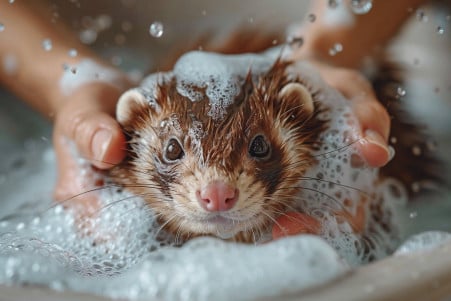Why Do Hedgehogs Smell? Exploring Their Musky Aroma
27 May 2024 • Updated 27 May 2024

Hedgehogs are cute and cuddly, but their musk and grooming habits can also make them stinky little critters. Yes, hedgehogs have a musky smell that is secreted from their face and underbelly scent glands. And yes, they groom themselves by licking their fur, which spreads saliva and skin oils that can cause an odor. While not overwhelming, a hedgehog's scent is noticeable.
To learn more about this interesting characteristic, we'll look at scientific studies conducted by animal researchers that shed light on a hedgehog's scent and scent-marking behavior. This will include research on their behavior, genetics, and the evolutionary reasons that hedgehogs have developed their distinctive scent. This knowledge will help hedgehog owners better understand and accept this aspect of their cute, spiky pets.
Do hedgehogs smell?
Medical Conditions and Poor Hygiene
There are several medical conditions that can cause hedgehogs to smell bad. According to the Merck Veterinary Manual, parasitic infestations such as quill mites (Caparinia tripilis) and sarcoptic mites (Notoedres spp.) are the most common reasons for excessive quill loss, scaly skin, and crusty buildup - all of which can cause bad smells. Fungal infections like ringworm (dermatophytosis) are also common and can cause crusting dermatitis and quill loss, according to VCA Animal Hospitals.
In addition to parasites, bacterial infections like Bordetella bronchiseptica-induced pneumonia can cause nasal discharge and respiratory symptoms that can affect a hedgehog's smell. Even gastrointestinal issues caused by things like Salmonella or an improper diet can cause diarrhea and dehydration that can make smells worse. It's important to note that a proper diagnosis is needed, which often requires skin scrapings to confirm mites or fungal cultures to confirm ringworm, according to the Pender Veterinary Centre.
Once diagnosed, veterinary care is needed to treat the underlying issue that's causing the smell. This can include medications, medicated baths or topical treatments, and even cleaning the hedgehog's environment to rid it of parasites and pathogens. With the help of a vet to treat these common issues, hedgehog owners can get the smell under control. This will help us better appreciate the natural musky smell that healthy hedgehogs have.
Why Do Hedgehogs Have a Natural Scent?
While hedgehogs don't have scent glands like many other animals, they do have specialized glands near the face, underbelly, and rear of their bodies that produce a musky scent. According to VCA Animal Hospitals, this scent has evolved to serve a purpose, possibly deterring predators.
In addition to their scent glands, hedgehogs also have a behavior called "anting" or "self-anointing", where they take substances with strong odors into their mouths, mix it with saliva, and then spread the mixture onto their spines. This can cause an irritation if a predator tries to lick, bite, or touch the hedgehog, which can help the animal defend itself.
Knowing the biological reasons for a hedgehog's natural scent can help pet owners understand and accept this unusual characteristic of their pets. With the right care and attention to hygiene, the musky scent can be controlled while still allowing the hedgehog to benefit from its natural adaptations.
How to Bathe a Hedgehog to Reduce Smell
According to Heavenly Hedgies, regular baths about once a month are effective in removing oils and dirt that cause odors. It's important to make sure that the water is warm, the shampoos are gentle, and the brushes are soft to avoid drying out the animal's skin. As suggested by Hedgehog Central, it's also important to make sure that the hedgehog is rinsed thoroughly and completely dry to avoid any lingering smells.
In addition to full baths, wikiHow recommends more frequent foot baths to help keep the animal's feet clean and reduce the smell in their cages. This way, the hedgehog can be kept smelling fresh without the risk of skin irritation and dryness that comes with too-frequent bathing.
Diet Changes to Help Reduce Hedgehog Smell
A diet that is high in protein is important for maintaining a hedgehog's skin and coat, which can help reduce odors. According to Heavenly Hedgies, some of the best foods for hedgehogs are insects like calci worms (black soldier fly larvae) and meats like boiled chicken, egg whites, and beef tripe. These protein options are a great way to get the necessary nutrients without the potential for the odors that come with dairy, acidic foods, nuts, and seasoned human foods.
In addition to making sure your hedgehog is getting enough to drink, make sure you aren't overfeeding your pet. This can also contribute to hedgehog smell, according to the Avian and Exotic Animal Hospital. By making sure you're feeding your pet a well-rounded, high-quality diet and making sure you're feeding them the right portion sizes, you can help reduce the smell your hedgehog produces while also helping them stay healthy. By focusing on the right diet, you can make sure that you're able to enjoy the natural, light musky scent of your hedgehog.
Litter Training for Odor Control
Litter training hedgehogs can go a long way in controlling the smell of their living space, according to Hedgehog Headquarters. They recommend using a low-entry litter pan and filling it with a safe, absorbent litter like recycled paper or pine pellets. Pins and Needles Hedgehogs says to place the litter box in a corner of the cage on top of a fleece liner, which will help absorb any mess and is easy to throw in the wash.
Like with cats, consistently putting the hedgehog in the litter box can help them learn to use it. As mentioned by Heavenly Hedgies, it will take time to train your hedgehog to use the litter box, but it will save you time on cleaning and give your hedgehog more freedom. Getting them in the habit of using the litter box before and after handling can help them learn to use it.
Although not all hedgehogs will take to litter training, the benefits of less smell and less cleaning are worth the effort for owners. With the right setup and consistent training, hedgehogs can be trained to use a litter box and keep their living space smelling fresh.
Keeping the Living Space Clean
In addition to helping maintain a healthy environment for your hedgehog, regular cleaning is also important for keeping odors at bay. According to Hedgehog Cage Cleaning and Maintenance, the plastic bottom of a wire cage is the most well-ventilated, which is important for odor control.
Hedgehog Care 101 says that safe bedding options include fleece, paper products, and specific types of wood shavings. However, cedar and pine shavings should be avoided because the oils in the wood can be poisonous and cause respiratory problems in hedgehogs. Good ventilation and regular cleaning of the cage, toys, and food/water bowls can help remove potential sources of odors.
By making sure that the cage is set up properly and that the right bedding is used and cleaned regularly, hedgehog owners can make sure that their pets are living in a clean and healthy environment. This will help ensure that any ongoing issues with odor can be addressed, especially if they require a trip to the vet.
When to Get Medical Help for Odor Problems
If the smell doesn't go away or if it comes back after cleaning your hedgehog's cage, it could be a sign of a medical issue. The I-20 Animal Medical Center explains that hedgehogs are good at hiding signs of sickness until they are very sick because their prey animal instincts make them want to appear healthy. That said, if you notice signs like quill loss, lethargy, or a lack of appetite, it's time to take your hedgehog to the vet. These could be signs of common hedgehog issues like mites, respiratory infections, or even cancer.
The vet will likely do a full examination and may need to do tests like skin scrapings or fungal cultures to figure out exactly what is causing the odor, according to the Pender Veterinary Centre. Once the cause is determined, the vet can prescribe the appropriate medications, topical treatments, or other treatments to help your hedgehog feel better. VCA Animal Hospitals also recommends taking your hedgehog to the vet for an annual wellness checkup to catch any potential issues that could cause odors before they get worse.
If you take your hedgehog to the vet and get the medical help you need to address the underlying causes of the odor, you should be able to get your hedgehog back to smelling like their normal, slightly musky self. This will help you enjoy your hedgehog's fun and quirky personality even more.
Conclusion: How to Deal With a Hedgehog's Smell
Hedgehogs have a natural musky odor that comes from their scent glands and the way they groom themselves. However, this smell is usually mild and can be minimized with proper care and a clean environment.
Knowing the causes can help you address odor problems through diet, hygiene, and veterinary care. With a few simple steps, you can enjoy the endearing nature of these prickly pets.


